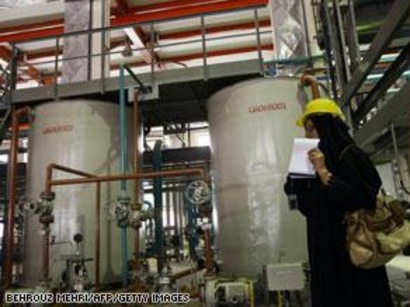Iran to convert enriched uranium to oxide powder

By Sara Rajabova
Iran is scheduled to convert its under two percent enriched uranium to oxide powder under the latest agreement with P5+1 group.
Head of the country's Atomic Energy Organization, Ali Akbar Salehi said Iran has 1.5 tonnes of fewer than two percent enriched uranium which it will convert to oxide powder.
Commenting on details of the Iran-P5+1's 18 July agreement, Salehi said Tehran has agreed to convert its 0.8 to 1.8 percent enriched uranium- waste product from enrichment - to oxide powder, ISNA news agency reported.
He went on to add that the mentioned storage is mainly enriched less than one percent.
Salehi didn't give more details on the issue.
Iran and the P5+1(five permanent members of the UN Security Council plus Germany) agreed to extend their nuclear negotiations for another four months until November 24 after failing to meet the July 20 deadline to reach a deal on curbing the Iranian nuclear program in exchange for ending sanctions.
Under the extension agreement, the U.S. will give Tehran access over the next four months to an additional $2.8 billion in oil export revenues frozen abroad by the U.S. sanctions in four stages of $500 million and two stages of $400 million.
Meanwhile, the International Atomic Energy Agency (IAEA) said it requires one million euros in additional funding to afford the expenses of overseeing the Iran-P5+1 interim nuclear deal during a four-month extension.
In a note to the IAEA member states on July 24, the agency said Iran and the six states - Russia, China, France, Britain, the US and Germany -- had asked the IAEA to continue its "nuclear-related monitoring and verification" of Tehran's nuclear activities until November 24, Reuters reported.
The agency said the continuation of the activities will require additional financial resources for the agency.
Iran and the six world powers said they have reached common ground on many key issues after six rounds of marathon talks in the Austrian capital of Vienna this year, but some serious gaps remain to be bridged.
The two sides inked a landmark interim deal in Geneva, Switzerland last November. The agreement took effect on January 20 and expired six months later on July 20.
Under the interim deal, Iran scaled back its nuclear energy program and agreed to the Western demand for more inspections of its nuclear activities. In return the country was provided with partial sanctions relief.
The IAEA has confirmed in its monthly reports over the past six months that Tehran has remained committed to the terms of its interim nuclear accord with the six countries, dubbed the Geneva Joint Plan of Action.
Here we are to serve you with news right now. It does not cost much, but worth your attention.
Choose to support open, independent, quality journalism and subscribe on a monthly basis.
By subscribing to our online newspaper, you can have full digital access to all news, analysis, and much more.
You can also follow AzerNEWS on Twitter @AzerNewsAz or Facebook @AzerNewsNewspaper
Thank you!
